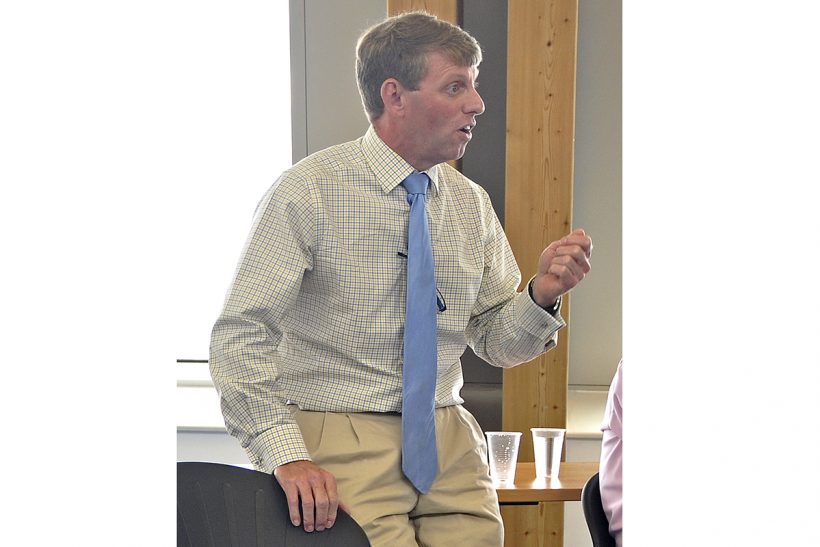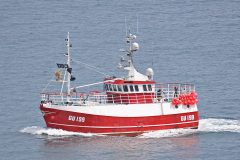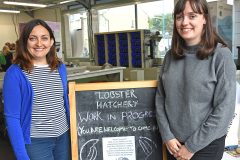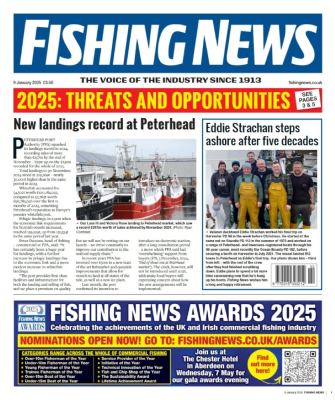Phil Haslam, director of operations at the MMO, took heavy questioning from an audience of local fishermen at a meeting at the Orbis Centre in Lowestoft last month, reports John Worrall.
Above: Phil Haslam fielding questions from the floor.
Local MP Peter Aldous, Mike Hookem MEP, Barry Deas, CEO of NFFO, Dave Cuthbert, chair of NUTFA, and Aaron Brown of Fishing For Leave, were also in attendance, ahead of a separate discussion later.
The meeting was called, and chaired, by June Mummery of BFP Eastern, operators of Lowestoft fish market who, with regulation bearing down increasingly on the inshore fleet, had decided that it was time for some air-clearing. Phil Haslam accepted the invitation ‘into the lion’s den’, as someone put it.
Issues ranged from bass problems to skate and spurdogs – their limited and zero quota respectively, despite huge proliferations – to the prospects (poor) for youngsters thinking of starting out.
The tying of bass entitlements to boats rather than licences came up early but that, Phil Haslam said, was an EU measure, although Dave Cuthbert disagreed, saying NUTFA had been told by the EU that MMO implementation of that measure was its own. But Phil Haslam insisted that the regulation required it, and refuted any suggestion that the MMO had knowingly taken the hardest possible interpretation to make the lives of inshore fishermen more difficult.
On the 10 tonnes-per-boat annual allowance, a questioner asked whether anyone in the room had caught 10t in a year. No one had. But then, as someone else pointed out, with catching options limited to inefficient long-lining and/or by-catch, to which a monthly maximum of the lower of 400kg or 3% of catch applied – and in trawls – they weren’t likely to; the monthly quotas of 2.5t of sole and 200kg of skate didn’t give enough fishing opportunity to yield a bass by-catch at anything like that level.
Again, Phil Haslam said that 10t was an EU thing, calling then for backup from Barrie Deas on the wider bass picture. Barrie Deas stated that for his part the bass restrictions were down to the science, and while he wasn’t among those who regarded all scientists as fools and knaves, ICES advice answered specific questions and the Commission’s question on bass had been: how do we get to MSY in one year?
In the event, the EU had decided to reach MSY by 2020, but that was an almost equally impossible target. It was a completely artificial crisis.
Another questioner said that the MMO took too long to tell fishermen whether they had bass entitlement; its house ‘was in disarray’.
Phil Haslam also refuted that, saying that 1,500 authorisation letters had gone out in April and where people had appealed refusals, the process had taken time.
Someone else said that it took weeks to get responses on licence or boats renewal which, Phil Haslam acknowledged, was not supportive of businesses and he would take that point away with him, but the MMO was looking to make the process ‘as slick as it can possibly be’.
Another asked why Suffolk under-10s got quota on haddock, plaice and megrim, which didn’t feature around there, adding that MMO was disconnected with the industry.
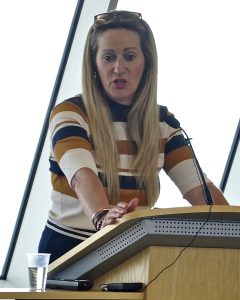
The meeting was convened and chaired by June Mummery of BFP Eastern, operators of Lowestoft fish market.
Phil Haslam said that the MMO could only allocate the quota it was given for the pool, but it did its best to maximise fishing opportunity. Where there was no requirement, it traded quota if possible. But it was constrained, and any seemingly ridiculous allocations were because of those constraints. The MMO recognised that the non-sector was having to get by on less and less, which was why quota managers bent over backwards to trade, uplift and make stocks available, and the fact that quotas were being fished at up to 90% showed that they were succeeding to a great extent.
And he refuted the charge that the MMO was disconnected. It had 14 teams around the country who were tapped-in locally, and could understand and feed back and input to policy and development. There might be resourcing issues in some places, but they were addressing those. But the underlying point was that there had to be a partnership between regulator and the industry; the industry had to comply with regulations, but the regulations had to make sense.
And on the spurdogs and skate – older fishermen had never seen such proliferations, according to one voice from the floor – Phil Haslam said that while he personally had known about spurdogs as early as 2013 (he was previously CEO of Eastern IFCA), the zero TAC was not something the MMO could address unilaterally. Policy was set at policy level, and his job was to deliver it.
But he emphasised that listening to the industry was essential to his role – it was why he was in Lowestoft – and, to that end, he then asked for a shopping list of measures to take away.
Sack all the scientists, was the first suggestion, because there was no better science than what fishermen saw on the ground.
But following on from that, there was general support for a move from quotas to effort control – very much a Fishing for Leave policy – where landings would give the real-time stock information that was patently lacking from the present picture.
A days-at-sea approach, if necessary with gear restrictions and monitoring – the technology was there – would allow fish to be caught when they were nearby. And anyway, said Aaron Brown, quotas benefited slipper skippers renting out quota, more than fishermen. For him, the three priorities were renewed effort control trials – allowed even under the CFP – banning slipper skippers, and getting a better allocation for the non-sector.
Phil Haslam said much of that, including a quota-to-effort switch, was not within his gift – DEFRA decided strategy, he merely implemented it – but he would certainly feed it all back.
In which case, added someone, could he feed back about the skate and spurdogs, because access to those stocks would fit exactly the local socio-economic aims of Article 17, which had never been implemented; in itself, Article 17 might be less relevant now with the CFP hopefully becoming redundant after Brexit, but the principle behind it certainly wasn’t.
On the future of the industry, one questioner pointed out that of those in the room, five were under 30, half were over 60 and some in their 40s. So in 20 years, half would probably be dead, and most of the rest retired. Who would be left? With the industry’s present difficulties, it was hard to see youngsters wanting to come in.
Phil Haslam had no immediate answer, except to say that a fishing industry was needed for food security, and stock management and recovery was key to that. Waters around this country were rich, but any debate on quota or effort wouldn’t matter if there weren’t new entrants coming into the industry. That aspect was not his business, day in, day out, but the MMO obviously has a vested interest in it.
The meeting edged towards a close with a hint of anti-climax because, although it had been therapeutic to give someone a kicking, that someone, Peter Aldous pointed out, was only the messenger, certainly on some issues. But he added that on strategic matters such as the quota/effort debate, it was important for the industry to speak with one voice. Unless that happened – if lobbying was splintered – then in his experience from seven years as an MP, government would take no notice.
June Mummery then thanked Phil Haslam, and hoped he had enjoyed himself. Phil Haslam for his part, sensing then that he was probably getting out alive, reiterated that he didn’t want to be someone sat behind a desk issuing edicts. He restated his undertaking to keep listening and to take action where he could, and to feed concerns along appropriate channels where he couldn’t. And the assembly then got stuck into the buffet to ensure nil discards.
Read more from Fishing News here.



